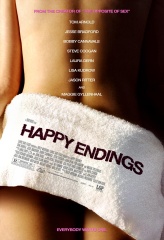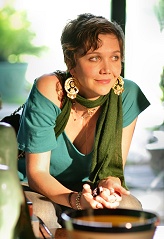|
Happy Endings |
| |
 |
USA, 2005. Rated R. 128 minutes.
Cast:
Lisa Kudrow, Maggie Gyllenhaal, Steve Coogan, Jesse Bradford, Tom Arnold, Jason Ritter, Bobby Cannavale, Laura Dern, David Sutcliffe, Sarah Clarke, Amanda Foreman
Writer: Don Roos
Cinematography: Clark Mathis
Producers: Holly Wiersma, Michael Paseornek
Director: Don Roos
LINKS |
 s writer/director Don Roos (The Opposite of Sex) too self-referentially post-modern for his own good? That won't leave you very happy at the end of Happy Endings, if that's the prevailing question you take home with you from the theater. It probably will be, too, because although the three story lines touch on some of the most controversial issues of today (homosexuality, abortion), they won't induce you to shake your fist at the sky or wonder What It All Means. In brief, those story lines are:
s writer/director Don Roos (The Opposite of Sex) too self-referentially post-modern for his own good? That won't leave you very happy at the end of Happy Endings, if that's the prevailing question you take home with you from the theater. It probably will be, too, because although the three story lines touch on some of the most controversial issues of today (homosexuality, abortion), they won't induce you to shake your fist at the sky or wonder What It All Means. In brief, those story lines are:
- A young would-be documentarian, Nicky (Jesse Bradford), won't tell Mamie (Lisa Kudrow) where the son she gave up for adoption is, unless she agrees to let him film the reunion.
- Charley (Steve Coogan) decides that a lesbian couple (Laura Dern and Sarah Clarke) have used his boyfriend's sperm to father their child after claiming the donation didn't work, and becomes obsessed with exposing them.
- A gold-digger named Jude (Maggie Gyllenhaal) falls for her mark (Tom Arnold) after seducing his homosexual son (Jason Ritter).
Some loose connective relationships between the three storylines and a common theme of parenthood—each of the three protagonists has somehow failed to be a parent or might fail to become one, leaving each of them feeling somewhat empty—compose the film's unifying elements. What makes Happy Endings a Roos film is its dark, frank humor, its unusual characters, and its distinctive voice. What will make or break the film in the eyes of its audience is Roos's voiceover technique.

Maggie Gyllenhaal as Jude in Happy Endings. |
Well, not voiceover exactly—captions with a distinct voice, running at regular intervals throughout the film. You'll often see a scene playing out on one side of the screen and verbiage on the other. Sometimes the commentary works, often making you laugh out loud and providing information you would never get from a straightforward depiction of the story. Sometimes it doesn't, particularly when it consists of observations redundant to what we can already see in the film.
For example, it's funny when Roos tells us not to worry if we don't like Mamie (she had a difficult time with her gambling-addicted ex-husband), because he's having a dig at Hollywood's sacred belief that mass-market audiences won't go for movies featuring characters they don't like. On the other hand, it's irritating when Roos observes that both Mamie, a counselor at an abortion clinic, and her idiot boyfriend Javier (Bobby Cannavale), a massage therapist, get paid to make people feel better. Individual viewers will no doubt react differently to this stylistic device, but it's safe to say Roos overuses it. He's not the most subtle guy with the foreshadowing either. Check out Jude (gee, that name isn't symbolic much) singing “honesty is such a lonely word” (from the Billy Joel song), and see if you can guess what's coming.
As he showed with Christina Ricci's Didi in The Opposite of Sex, Roos has a facility for creating distinctive female characters, casting them perfectly, and feeding them great lines. Despite playing far afield from her ditzy television characters, Kudrow seems born to recite Mamie's acerbic dialogue (as she did in The Opposite of Sex). Gyllenhaal's offbeat, gangly beauty is a perfect fit for the unconventional, free-spirited Jude. Steve Coogan of 24-Hour Party People, almost unrecognizable with short hair and slightly effeminate mannerisms, also has some great moments, like when he observes to his boyfriend Gil (David Sutcliffe), “You're not faggy at all. The gayest thing about you is me.”
Coogan's Charley is the exception among the men, though. In general Roos isn't nearly as good with male characters—check out Martin Donovan's drippy Bill Truitt in The Opposite of Sex and Ben Affleck's boring Buddy Amaral in Bounce. In Happy Endings the men range from dull (Tom Arnold basically plays himself on Prozac and Jason Ritter does his best Mr. Cellophane impression) to the downright aggravating (Cannavale irritates and Jesse Bradford is begging to have a table lamp smashed in his face).
Though why Kudrow tries to help Nicky and Jude falls for Frank are unexplained mysteries, they're not necessarily a story flaws, however. Roos's world is peopled by impulsive, compulsive, dysfunctional characters, and Roos has great affection for these seemingly unlikable people. “They're just human,” he seems to be saying. “We're all that way.” That's when the captions function best, when they help draw out and refine that perspective in humorous ways.
Happy Endings considers itself “a comedy…sort of,” and is also a decent film…sort of. It's worthwhile for the performances and one liners by the three leads (Kudrow, Gyllenhaal, and Coogan) and for Roos's unique perspectives as a storyteller, close captioned for cognitively impaired.
Read AboutFilm's interview with writer/director Don Roos.
Review © July 2005 by AboutFilm.Com and the author.
Images © 2005 Lions Gate Films. All Rights Reserved.


